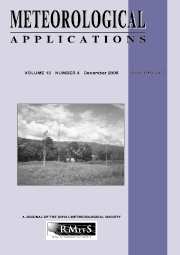Crossref Citations
This article has been cited by the following publications. This list is generated based on data provided by
Crossref.
Heinemann, Günther
and
Klein, Thomas
2002.
Modelling and observations of the katabatic flow dynamics over
Greenland.
Tellus A: Dynamic Meteorology and Oceanography,
Vol. 54,
Issue. 5,
p.
542.
Heinemann, Günther
and
Klein, Thomas
2002.
Modelling and observations of the katabatic flow dynamics over
Greenland.
Tellus A: Dynamic Meteorology and Oceanography,
Vol. 54,
Issue. 5,
p.
542.
Heinemann*, Günther
2003.
Forcing and feedback mechanisms between the katabatic wind and sea ice in the coastal areas of polar ice sheets.
Journal of Atmospheric & Ocean Science,
Vol. 9,
Issue. 4,
p.
169.
Claud, Chantal
Heinemann, Guenther
Raustein, Elmer
and
Mcmurdie, Lynn
2004.
Polar low le Cygne: Satellite observations and numerical simulations.
Quarterly Journal of the Royal Meteorological Society,
Vol. 130,
Issue. 598,
p.
1075.
PETERSEN, GURUN NINA
KRISTJANSSON, JON EGILL
and
OLAFSSON, HARALDUR
2004.
Numerical simulations of Greenland's impact on the Northern Hemisphere winter circulation.
Tellus A,
Vol. 56,
Issue. 2,
p.
102.
Petersen, Guđrún Nína
Kristjánsson, Jón Egill
and
Ólafsson, Haraldur
2004.
Numerical simulations of Greenland’s impact on the Northern Hemisphere
winter circulation.
Tellus A: Dynamic Meteorology and Oceanography,
Vol. 56,
Issue. 2,
p.
102.
Orr, Andrew
Hanna, Edward
Hunt, Julian C. R.
Cappelen, John
Steffen, Konrad
and
Stephens, Ag
2005.
Weather and Climate: The M.P. Singh Volume, Part II.
p.
1747.
Serreze, Mark C.
and
Barry, Roger G.
2005.
The Arctic Climate System.
Moore, G. W. K.
and
Renfrew, I. A.
2005.
Tip Jets and Barrier Winds: A QuikSCAT Climatology of High Wind Speed Events around Greenland.
Journal of Climate,
Vol. 18,
Issue. 18,
p.
3713.
Jung, Thomas
and
Rhines, Peter B.
2007.
Greenland’s Pressure Drag and the Atlantic Storm Track.
Journal of the Atmospheric Sciences,
Vol. 64,
Issue. 11,
p.
4004.
Moore, G. W. K.
Pickart, R. S.
and
Renfrew, I. A.
2008.
Buoy observations from the windiest location in the world ocean, Cape Farewell, Greenland.
Geophysical Research Letters,
Vol. 35,
Issue. 18,
Kolstad, E. W.
2008.
A QuikSCAT climatology of ocean surface winds in the Nordic seas: Identification of features and comparison with the NCEP/NCAR reanalysis.
Journal of Geophysical Research: Atmospheres,
Vol. 113,
Issue. D11,
Petersen, G. N.
Renfrew, I. A.
and
Moore, G. W. K.
2009.
An overview of barrier winds off southeastern Greenland during the Greenland Flow Distortion experiment.
Quarterly Journal of the Royal Meteorological Society,
Vol. 135,
Issue. 645,
p.
1950.
Blechschmidt, A.‐M.
Bakan, S.
and
Graßl, H.
2009.
Large‐scale atmospheric circulation patterns during polar low events over the Nordic seas.
Journal of Geophysical Research: Atmospheres,
Vol. 114,
Issue. D6,
Zahn, Matthias
and
von Storch, Hans
2010.
Decreased frequency of North Atlantic polar lows associated with future climate warming.
Nature,
Vol. 467,
Issue. 7313,
p.
309.
van Angelen, J. H.
van den Broeke, M. R.
and
van de Berg, W. J.
2011.
Momentum budget of the atmospheric boundary layer over the Greenland ice sheet and its surrounding seas.
Journal of Geophysical Research,
Vol. 116,
Issue. D10,
Kilpeläinen, Tiina
Vihma, Timo
and
Ólafsson, Haraldur
2011.
Modelling of spatial variability and topographic effects over Arctic
fjords in Svalbard.
Tellus A: Dynamic Meteorology and Oceanography,
Vol. 63,
Issue. 2,
p.
223.
Harden, B. E.
Renfrew, I. A.
and
Petersen, G. N.
2011.
A Climatology of Wintertime Barrier Winds off Southeast Greenland.
Journal of Climate,
Vol. 24,
Issue. 17,
p.
4701.
Kristjánsson, Jón Egill
Thorsteinsson, Sigurdur
Kolstad, Erik W.
and
Blechschmidt, Anne‐Marlene
2011.
Orographic influence of east Greenland on a polar low over the Denmark Strait.
Quarterly Journal of the Royal Meteorological Society,
Vol. 137,
Issue. 660,
p.
1773.
Lüpkes, Christof
Vihma, Timo
Birnbaum, Gerit
Dierer, Silke
Garbrecht, Thomas
Gryanik, Vladimir M.
Gryschka, Micha
Hartmann, Jörg
Heinemann, Günther
Kaleschke, Lars
Raasch, Siegfried
Savijärvi, Hannu
Schlünzen, K. Heinke
and
Wacker, Ulrike
2012.
Arctic Climate Change.
Vol. 43,
Issue. ,
p.
279.


